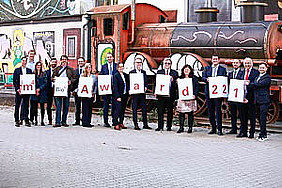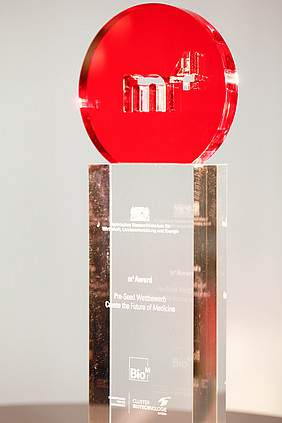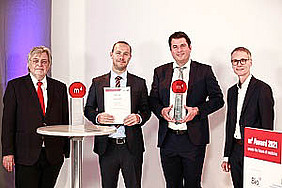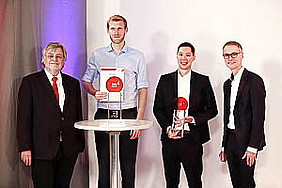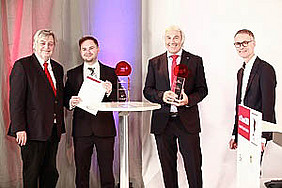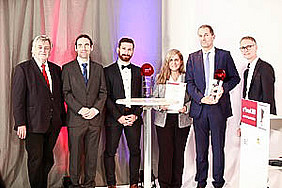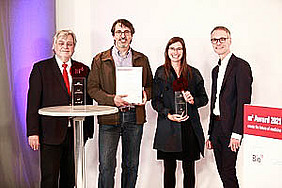The winners of the Bavarian pre-founding competition m4 Award 2021 have their finger on the pulse with innovative biomedical projects.
- Announcement of the m4 Award winners during the 3rd BioEntrepreneurship Summit 2021.
- 2.5 million euros in funding for innovative projects to develop new active agents against diseases with a high unmet medical need.
- Innovative drug development and drug discovery tools, preventive medicine approaches, diagnostic platforms and research tools are the focus of this year's m4 Award.
- The Bavarian pre-seed competition m4 Award supports start-ups in the field of biomedicine.
The Bavarian State Ministry of Economic Affairs, Regional Development and Energy today announced the five winners of this year's m4 Award pre-seed competition together with BioM at the BioEntrepreneurship Summit 2021 start-up event on October 21, 2021. Each winning team will receive up to 500,000 euros for two years from the Bavarian Ministry of Economic Affairs, Regional Development and Energy. Due to the current situation, the award ceremony took place as a virtual event.
One of the selected teams is developing special viruses, bacteriophages, with whose urgently needed help antibiotic resistance can be circumvented. Two of the winning teams are working on innovative therapeutic options for treating the widespread disease diabetes, and another team is working on reducing cardiovascular diseases. Hair loss also affects a not inconsiderable proportion of the population (40-70%), and one of the winning teams wants to find a remedy here.
Four winning teams are conducting research in Munich, one group at Helmholtz Zentrum München, one team at Technische Universität München (TUM), one group at Ludwig-Maximilians-Universität München (LMU) and one team in a collaboration between TUM and LMU. The fifth winning team works at the University Hospital Erlangen. The 26 high-caliber applications were received from research institutions throughout Bavaria.
With prize money of up to 500,000 euros for two years per winning team, the competition supports the further development and validation of the respective project idea in preparation for a spin-off. In the process, the scientists not only receive financial support, but also active guidance from BioM and other partners as well as industry experts.
In his video message, State Secretary Roland Weigert praised biotechnology as a key technology of the 21st century - the coronavirus pandemic just impressively confirmed this.
"The development of BioNTech's mRNA vaccine, which is used worldwide, is a success story 'Made in Germany' - we can be very proud of that!" emphasized Roland Weigert. "The Free State of Bavaria has not remained idle and, for example, is supporting Bavarian biotechnology companies in the development of therapeutics against COVID-19 with 50 million euros as part of the Bavarian Therapy Strategy. With its initiative, Bavaria has also been an important initiator at the federal and EU level."
Roland Weigert also underlined the success of the previous competition rounds, from which nine spin-offs have already been realized, and also wished this year's winners every success for the future.
Prof. Dr. Horst Domdey, Managing Director of BioM, hosted the event and was enthusiastic about the innovative projects of the winning teams. He is convinced to see their products on the market in the future.
"The m4 award has been a success story for years and I am confident that with this year's winners the success story will be continued."
In his welcoming remarks, Dr. Manfred Wolter (StMWi), Ministerial Director for Innovation, Research, Technology and Digitalization, echoed Weigert's good wishes and thanked Prof. Domdey for the valuable work of BioM. He emphasized that throughout the industry, business ideas do not remain in a drawer, but are implemented directly - also with the help of the m4 Award. The financial and infrastructural support of biotechnology on the part of the Bavarian state government helped make Bavaria the leading biotechnology location in Germany and will continue to provide it with a secure basis in the future.
With the m4 Award, initiated in 2011 by BioM, the network organization of the biotechnology industry in Munich and Bavaria, the Free State of Bavaria promotes innovative products, technologies or services of young companies that decisively advance the further development of medicine of the future. The prize is awarded every two years, and a total of 25 research projects have been honored in the five rounds of competition to date.
The winners of the m4 Award 2021 with short profiles of their projects
Prof. Dr. Heiko Lickert
Dr. Nikolas Uez
Helmholtz Zentrum München
BetaRegeneration - Targeting ß-cell protection and regeneration for diabetes remission
Diabetes is a widespread disease that is still treated symptomatically. A cure is not yet possible. The team led by Prof. Heiko Lickert is developing a monoclonal antibody against an insulin inhibitory receptor that has a protective effect on the ß-cells of the pancreas. With this novel approach, a causative therapy for diabetes could become possible for the first time.
Dr. Patrick Großmann
Dr. Kilian Vogele
Dr. Viktoria Krey
Sophie von Schönberg
Franziska Winzig
Technische Universität München (TUM)
Invitris - In vitro synthesis of multivalent bacteriophages for the therapy of antibiotic-resistant infections
Antibiotic-resistant germs are a major problem that will become massively more acute in the coming years. The idea of treating infections with resistant germs with bacteriophages, i.e. viruses that infect bacteria, has been around for almost 100 years. So far, however, the approach has failed to catch on because the production of phages has not been scalable and had to take place in the pathogenic host bacteria. Invitris has now developed a technology that can be used for the first time to produce genetically optimized bacteriophages for the treatment of antibiotic-resistant infections in vitro.
Prof. Dr. Alexander Steinkasserer
Prof. Dr. med. Carola Berking
Dr. Dmytro Royzman
Universitätsklinikum Erlangen, Friedrich-Alexander-Universität Erlangen-Nürnberg
MalliaBioTech - Soluble CD83 as a new product for topical treatment in hair loss
Hormone-associated hair loss represents a huge problem worldwide, since up to 70% of all man and 40% of all women suffer from it. To date, only two substances, with a scientifically proven efficacy, have been approved for the treatment of this disorder. They however, go along with considerable disadvantages and efficacy is quickly lost after discontinuation of treatment. Prof. Steinkasserer's team is developing a new product, based on a soluble form of the CD83 molecule, for the topical treatment of hormone-associated hair loss. In preclinical studies this active ingredient revealed so far no side effects and, in contrast to the two approved drugs, induces the formation of new hair follicles and thus new hair growth. Therefore, due to this USP, this new product has the potential to satisfy the huge unmet market needs of hair loss and in the medium term to possibly even extend it.
Prof. Dr. Jürgen Bernhagen
Prof. Dr. Aphrodite Kapurniotu
Christos Kontos
Markus Brandhofer
Klinikum der Universität München (LMU Klinikum), Ludwig-Maximilians-Universität (LMU) München und Technische Universität München (TUM)
SELECKREM - Preclinical development of peptide-based chemokine receptor mimetics as ligand-selective agents in atherosclerotic disease
Despite significant medical advances, atherosclerotic diseases such as myocardial infarction and stroke remain the leading cause of death worldwide. A major problem is the residual inflammatory risk of in patients that are otherwise on a well-controlled lipid-lowering treatment plan. With the m4 application, Prof. Bernhagen's lab at LMU together with Prof. Kapurniotu’s lab at TUM aims to develop chemokine receptor mimics as a new class of drug leads to selectively inhibit atherosclerosis-causing chemokines for the huge pharmaceutical market of cardiovascular diseases.
Prof. Dr. Andreas Ladurner
Dr. Maren Heimhalt
Matin Moschref
Christiane Kotthoff
Ludwig-Maximilians-Universität München (LMU)
SugarSwitch- First-in-class agonists / antagonists a novel & essential sugar metabolite receptor
Obesity and insulin resistance have become a pandemic. 20% of Europeans will develop type 2 diabetes (T2D) by 2030. Prof. Ladurner's team is developing agonists or antagonists (small molecule drugs) for a transcription factor that is crucially involved in sugar and lipid homeostasis.

